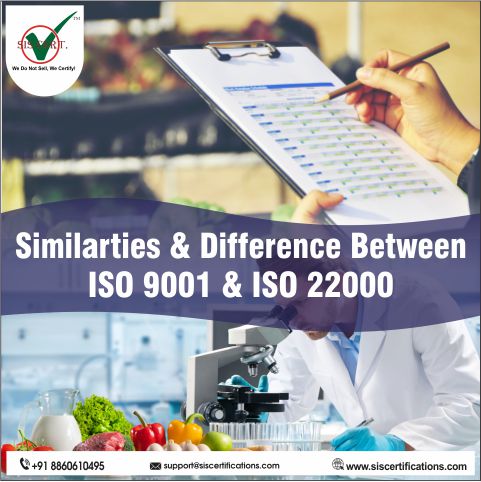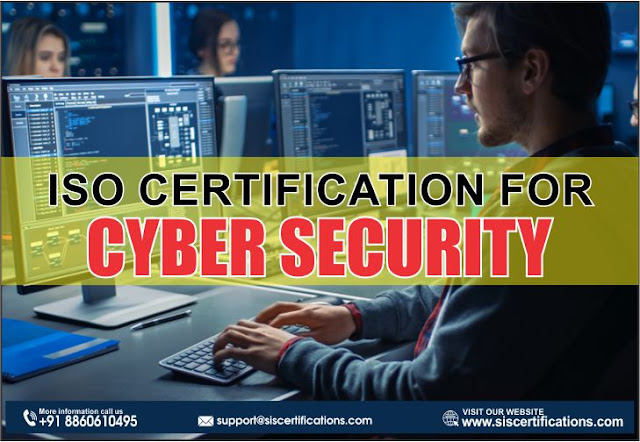Similarities & Difference between ISO 9001 and ISO 22000
What is ISO 22000 Certification?
ISO 22000 certification ensures successful processes that would reliably deliver quality products and services to meet customer and other stakeholder expectations. The ISO 22000 Certification applies to the food industry of all sizes and sectors. ISO food standards are moral for producers and manufacturers, regulators and retailers, and, more importantly, for you and me, for consumers.
What are the benefits of ISO 22000 Certification to your Organization
Engagement of HACCP and other preventive plans that ensure food safety
Commitment to customer satisfaction
Improves the reputation of the company
Alignment with other internationally acknowledged standards
Helps minimize food safety risks
Increases transparency in food safety responsibility
Benefits of ISO 22000 to your Customer:
Ensured safe food
Better quality in the food industry
Conformity of products and services
Ensures quality, safety, and reliability
What is ISO 9001 Certification?
It is characterized as the worldwide standard that determines necessities for a quality management System (QMS). It is the most well-known norm in the ISO 9000 series and the main norm in the series to organizations can ensure. ISO 9001 was first proclaimed in 1987 by the International Organization of Standardization (ISO) an international agency composed of the national standards bodies of over 160 nations.
Benefits of ISO 9001 Certification
ISO 9001 Certification in Canada assists organizations with guaranteeing their customers get top-notch products and services, which brings many advantages including fulfilled customers, executives, and employees.
It shows the necessities for viable quality management and administrative framework. Organizations track down using the standards help them-
Put together a QMS
Make fulfilled and satisfied customers, the executives, the management, and the employees.
Persistently improve their processes
Save costs
Similarities between ISO 9001 And ISO 22000 Certification
Control of Documented Information (Documents & Record Control)
Organizational context (internal and external issues, interested parties, scope)
Risk and Opportunity Management, Planning, and Targets.
Improving, taking corrective action.
Branch Review and Internal Audits.
Competency, communication, training
Differences between ISO 9001 And ISO 22000 Certification
THE ISO 9001 Certification refers to QUALITY MANAGEMENT SYSTEM and ISO 22000 refers to FOOD SAFETY MANAGEMENT SYSTEM. ISO 9001 is the foundation and backbone for all quality systems and can apply to any organization irrespective of the size. Different standards were required in different areas at different times.
Although it contains the same requirements for quality management systems as the other revised standards, there are few special technical requirements that make this standard unique for food industry organizations. Clause 8 of the standard sets out these requirements, which essentially guarantee that food is technically safe. These requirements are as follows:
Operational planning & control - The manner in which the organization plans its activities (processing) and controls food safety at the same time.
Prerequisite Programs- The determination of the basic conditions and activities necessary to maintain a sanitary environment throughout the food chain.
Traceability system- Traceability system for foodstuffs.
Preparation and monitoring in case of emergency- Identifying and arranging for all potential emergency situations.
Hazard control - This includes conducting a hazard analysis, identifying and validating control measures, and preparing the HACCP system.
Updating information - Updating information related to PRPs and maintaining risk control plans.
Monitoring & measurement control.- The manner in which the organization controls its monitoring and measurement systems.
Verification related to PRP and Hazard Control Plans.- Audit and analysis of PRPs and risk control plans.
Control of nonconforming products and processes- how the organization controls its non-compliant products and processes, including recall or withdrawal.
Food security is an important concern for Canada. Most foods coming into Canada are subject to rigorous scrutiny. There are a number of standards that manufacturers or distributors must comply with in order to bring their products to the Canadian market. In this respect, achieving ISO 22000 certification in Canada can be of great help to food industry stakeholders. ISO 22000 certification is evidence of an organization's commitment to providing safe food that causes no injury or illness.



Comments
Post a Comment